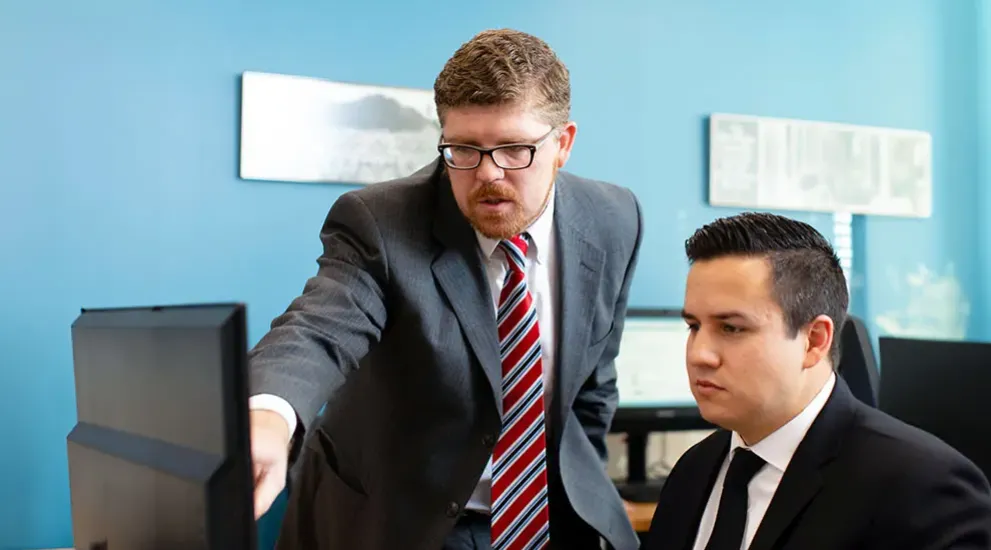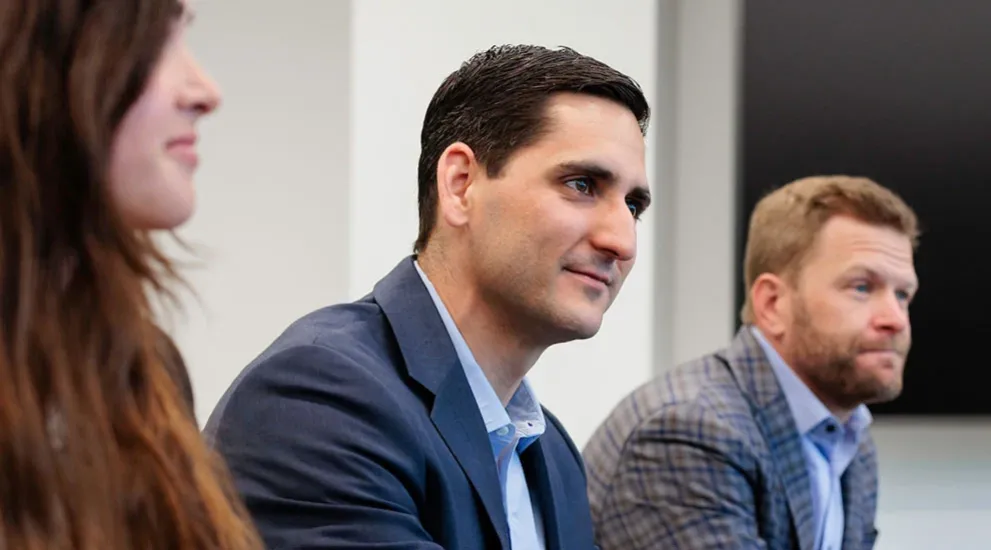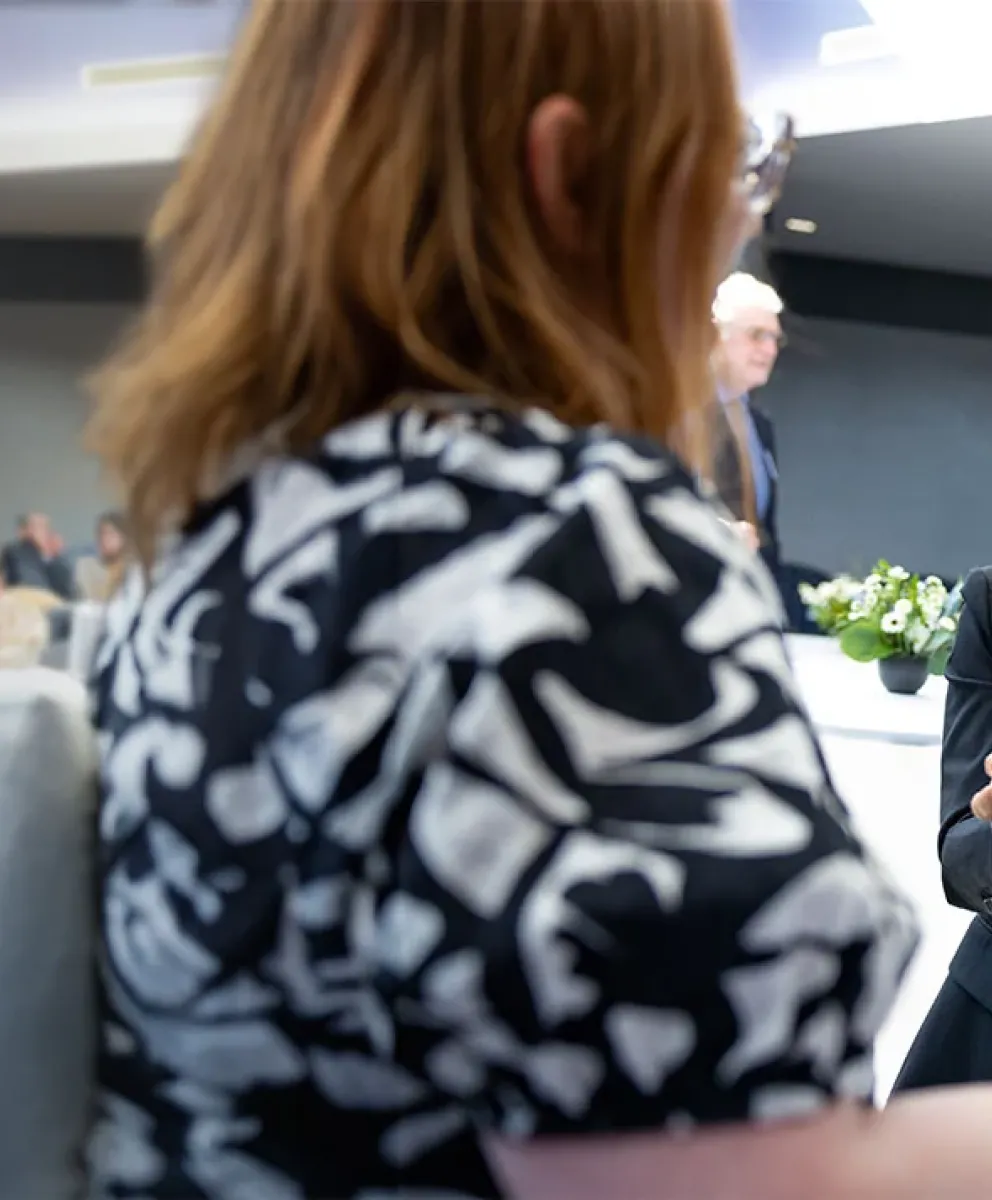
Student and Alumni Resources
Supporting Impactful Careers
If you’re interested in starting a law career that makes a difference in the world—rather than just finding a job—the Creighton University School of Law Career Development Office can provide the resources and counseling you need. We make it easy to discover career opportunities across the state, the country and the world. We also organize events, such as our Lawyer Lunch series and Interviewing Skills Panel, to give you practical advice and insights from current legal practitioners. At the CDO, we’re truly here for you—as mentors, connectors, supporters and partners in crafting your career.
Contact
Career Development Office
cdo@creighton.edu
402.280.3094
Facilitating the Future
During orientation, you’ll learn more about how we can help you connect with future employers and start a career after graduating from the School of Law. You’ll discover the wide range of employment-focused resources we offer, which include:
- Symplicity, an online system where you can find information about career events and job fairs, jobs and internships, employers, workshops and more
- On-campus interviews each fall and spring with employers who are interested in students that have applied for open positions
- Our resume collections program, which gathers student resumes for employers who aren’t able to participate in on-campus interviews
In addition to these resources, we offer career programs throughout the academic year and individual career counseling related to:
- Resume and cover letter writing
- Job search strategies
- Interviewing skills
- Reference selection
- Legal career options
- Career objectives discovery
Creighton also offers the ability to find a job through the Handshake site. Although the jobs posted on Handshake do not apply to law, they may include jobs that interest dual-degree students (e.g., JD/MBA).
Alumni Connections
The CDO can also connect you with our greatest asset: our strong alumni network. Creighton School of Law alumni can share what they’ve learned and help you make connections for your future. Many of our alumni are listed in the Martindale-Hubbell© Law Directory.
Networking Events
You’ll also have an opportunity to interact with members of the legal community in a range of events. Area law firms host lunches in the fall and open houses in January. The Nebraska Bar Association hosts speed networking events, offering students quick 1:1 interaction with attorneys in a variety of specialty areas. And Creighton funds student admission to the Omaha Bar Association’s annual barbecue, which 300-400 local lawyers attend. Creighton’s Career Development Office shares details about upcoming events with students on an ongoing basis. Contact us if you have questions.
Supporting Those Working in the Public Interest
At Creighton University School of Law, our mission is to create “ethical lawyers who will zealously and competently represent clients within the bounds of the law and, at the same time, recognize their duty to improve society.” Our public interest programs are designed to support lawyers who recognize that duty. Our Loan Repayment Assistance Programs (LRAPs) and Creighton Fund for Clerkships in the Public Interest (CFCPI) can help fund our students’ careers—in acknowledgment of the disparity between the high cost of education and the relatively low pay of public interest positions.
Details about Creighton’s LRAPs
Our LRAPs are open to recent graduates (i.e., up to one year post-graduation) that offer reimbursement for loans for those working in nonprofits, government entities or public interest organizations. Applications are due in late December. Our current LRAPs include:
- The Heaney Family Loan Repayment Assistance. This fund is awarded to students who are graduating students who are employed in a public interest field including non-profit and legal service organizations and public defender offices. A preference shall be given to those students who demonstrate a financial need and who shall be employed in the state of Nebraska.
- The Harold L Rock Loan Repayment Assistance Program. This fund will be awarded to students who are graduating students who are employed in a public interest field including non-profit and legal service organizations, criminal prosecuting and public defender offices, government, labor unions or private public interested law firms. A preference shall be given to those students who demonstrate a financial need and who shall be employed in the state of Nebraska.
Goals of Our LRAP Programs
- Encourage new law school graduates to seek employment in specific public interest legal settings—allowing them to provide legal assistance to those who can’t afford it
- Motivate new law school graduates to work as lawyers in jobs that will benefit the overall public interest
- Ease the financial burden of new graduates in exchange for their commitment to practicing public interest law
- Inform students who do not enroll in the program of the need for assistance to the poor, and encourage them to provide pro bono service
The CFCPI Program
This program offers a great way for first- and second-year students to build experience while earning income during the summer. Specifically, the program funds clerkships with government and non-profit entities that would otherwise be unpaid. To be considered for one of these clerkships, we recommend the following:
- Search a list of organizations who have employed students using CFCPI grants in the Public Interest Employer Database
- Review the PSJD website for internships, postgraduate fellowships and permanent positions across over 11,000 organizations
- Complete and submit the CFCPI application
Creighton University School of Law believes in uniting students and educational opportunities for the greater good. That’s what drives our reciprocity agreements with other law schools. Through these agreements, we can help you access other schools' career planning offices and facilities. Details about our reciprocity policies are below.
- If you’re a Creighton law student or graduate, contact our Career Development Coordinator, Mandy Whiddon, to find out which other law schools offer reciprocity.
- If you are NOT a Creighton law student or graduate, we offer reasonable use of our services under these terms:
- Services are available only to students and alumni whose law schools provide privileges to Creighton School of Law students and alumni.
- Requests for reciprocity must be made in writing by a career services official at the requesting law school’s career services office. It should indicate the name, address and year of graduation of the student or alumni requesting services. The written request should also include a statement of services that the requesting school will provide to our students and alumni.
- The Creighton School of Law’s CDO will notify the requesting law school’s career services office when reciprocity has been granted, and a copy of the notification will be sent to the student or graduate.
- Reasonable access to Symplicity, our online job database, will be granted, and reciprocity privileges will be extended for a three-month period (from the date of granting); it may be extended beyond this period at Creighton’s discretion. Reciprocity students and graduates may not schedule on-campus interviews or participate in job fairs.
- The CDO may deny further services to any individual who misuses the facilities or services. The assistant dean for career development may also deny further services to any law school that either surpasses a reasonable number of reciprocity requests within any academic year or limits the number of requests by Creighton School of Law students or alumni.
- Reciprocity will be offered throughout the year, except during our blackout periods: August 1 to September 30 and January 1 to February 15.
The CDO has recently helped launch careers at the following law firms and organizations.
Colorado
- Advisor Law
- Colorado Attorney General’s Office
- Davis Graham
- Holland & Hart LLP
Illinois
- Sidley Austin
Iowa
- Brown Winick Law
- Lane & Waterman, LLP
Missouri
- Husch Blackwell, LLP
- Lathrop & Gage, LLP
- Shook, Hardy & Bacon
- Stinson LLP
Nebraska
- Abrahams Kaslow & Cassman, LLP
- Baird Holm, LLP
- Berry Law
- Cline Williams Wright Johnson & Oldfather, LLP
- Douglas County Public Defender’s Office
- Douglas County Attorney’s Office
- Dvorak Law Group
- Fraser Stryker, PC, LLO
- Gross Welch Marks Clare
- Hightower Reff Law
- Husch Blackwell
- Koley Jessen, PCLLO
- Kutak Rock
- Lamson Dugan & Murray LLP
- McGrath North
- Pansing Hogan Ernst & Buser
- Woods Aiken
Preparing for Bar Admission
In order to practice law after graduation, you must be admitted to practice in a specific jurisdiction. This involves an extensive application process and a multiple day examination (the “Bar Exam”), which is administered by a particular state’s board of bar examiners—generally every February and July. Upon successful completion of a state’s admission requirements, you will become a member of the state bar and will be licensed to practice law in that state.
Since the format and subjects covered in the exam vary by jurisdiction, we highly recommend that all School of Law students review the requirements of the state (or states) in which they would like to practice. Details about bar exam test dates, multistate tests and pass rates are available on the National Conference of Bar Examiners website. Below, we have also included some helpful information about preparation courses, exam terminology and registration requirements, and qualifications for bar admission.
- Multistate Bar Examination (MBE): This is a six-hour, 200-question multiple-choice examination. It covers contracts, torts, constitutional law, criminal law, evidence, real property and civil procedure (beginning in February 2015).
- Multistate Essay Examination (MEE): This three-hour, six-question essay examination covers agency and partnership, commercial paper, conflict of laws, corporations, decedents’ estates, family law, federal civil procedure, sales, secured transactions, and trusts and future interests. Some states draft their own essays in addition to (or instead of) the MEE. Students are required to answer based on state-specific laws.
- Multistate Performance Test (MPT): This test includes three 90-minute skills questions covering legal analysis, fact analysis, problem solving, resolution of ethical dilemmas, organization and management of a lawyering task, and communication.
- Multistate Professional Responsibility Examination (MPRE): This 60-question, two-hour multiple-choice examination is administered three times each year, and it is separate from the Bar Exam administered by the NCBE. The MPRE is required for admission in all but two U.S. jurisdictions (Puerto Rico and Wisconsin); and Connecticut and New Jersey will accept the successful completion of a law school course on professional responsibility in lieu of a passing score on the MPRE. Third-year (3L) students should plan to take the MPRE no later than the November test date; the registration deadline for this test date is typically in mid-September. For more information, visit the NCBE website.
- Uniform Bar Examination (UBE): As of February 2013, this is Nebraska’s accepted test, which is prepared and coordinated by the National Conference of Bar Examiners (NCBE). It is designed to test knowledge and skills that every lawyer should be able to demonstrate prior to becoming licensed to practice law. The UBE is composed of the MEE, two MPT tasks, and the MBE. It is uniformly administered, graded, and scored by user jurisdictions and results in a portable score. States adopting the UBE will accept score transfers from other UBE states. For a list of all states that have adopted the UBE, visit the NCBE website.
The following states require (or encourage) law students to register for the bar examination at the beginning of their first or second year of law school.
- Alabama: Required within 60 days of starting law school
- California: Required within 90 days of starting law school
- Florida: Encouraged in the first year of law school
- Illinois: Required by March 1 in the year following an applicant’s law school commencement—or July 1 for spring semester matriculants
- Iowa: Required by January 15 of the first year of law school
- Mississippi: Required by October 1 in the second year of law school
- North Dakota: Required by October 1 in the second year of law school (or 14 months after the first day of law school)
- Ohio: Required by November 15 in the second year of law school
- Oklahoma: Required by October 15 in the year following an applicant’s law school commencement
Note that some states provide reduced registration fees for students who register early to take the bar; please check the requirements for your state.
Every U.S. jurisdiction has character, fitness, and other qualifications for admission to the bar—in addition to a bar examination. Students are encouraged to determine the requirements for any jurisdiction in which they intend to seek admission. Information about all relevant agencies is available through the National Conference of Bar Examiners (NCBE).
Information a student provides when applying for law school may be reviewed by the admission agencies for consistency with the student’s record at the time of seeking admission. Therefore, it is essential that every student who applies to law school provides complete, accurate, and truthful information in their application.
For more information, please refer to the following:
Making a Difference in Nontraditional Legal Careers
A degree from Creighton University School of Law is versatile. It can prepare students for careers beyond the law—whether in business, lobbying, public affairs, human resources, publishing or broadcasting. The options are virtually endless. To discover the nontraditional or alternative legal careers available to you, we invite you to attend a lunchtime panel discussion with Creighton School of Law alumni who are working outside the traditional practice of law. You can also schedule a one-on-one appointment with one of our career counselors to discuss finding a career that’s right for you. For more information, please visit Symplicity.

- The Creighton Financial Aid Office: Dean Obenauer in the Financial Aid Office can provide advice to alumni regarding income-based repayment (IBR) and public service loan forgiveness (PSLF) programs, as well as other repayment options. Although IBR and PSLF are available for only federal student loans, they can help make monthly student loan payments more manageable. Contact Dean via email or call him at 402.280.2731.
- Equal Justice Works (EJW): This organization provides information related to student debt relief, including income-based repayment and public service loan forgiveness. EJW also offers webinars discussing both programs.
- IBRinfo.org: This site contains information about the income-based repayment option, as well as a calculator for determining monthly payments.
- The Pay As You Earn Plan: This plan is designed to keep your monthly student loan payments affordable; it usually has the lowest monthly payment amount of the plans that are based on income.
- Public Service Loan Forgiveness: The United States Department of Education offers an Employment Certification Form for Public Service Loan Forgiveness (PSLF). Using this form allows Direct Loan borrowers who work in the public and nonprofit sectors to receive confirmation that their job counts as qualifying employment for PSLF. It can also help track your eligibility, inform you when it’s time to apply for forgiveness, and provide the paperwork you need.
- State-Based LRAP Programs: This website contains information about the state bar associations that offer loan repayment assistance programs.
- Ask Heather Jarvis, Student Loan Expert: This site features guidance and resources from Heather Jarvis, one of the nation’s leading authorities on income-based repayment and public service loan forgiveness. It also offers frequent webinars and blog posts to help you navigate what is sometimes a confusing process. We also recommend reading The Employee and Employer Guide to Public Service Loan Forgiveness, authored by Jarvis and the American Bar Association.
Staying Connected as an Alumni
Your connection to Creighton University School of Law doesn’t end at graduation. Our Career Development Office (CDO) will always be here for you—to help craft job search strategies, review your resume and cover letters, or offer job search advice. You will also retain access to Symplicity, our online job-posting system.
Because you’ve stood in our current students’ shoes, your advice to them is invaluable. To participate in a panel discussion, serve as a career resource, or provide other forms of support to current law students, please email the CDO.
As one of more than 8,000 Creighton School of Law alumni across the country—and around the world—we also encourage you to network with one another through our Creighton Alumni Groups or at an upcoming Creighton alumni event.

Accreditation, Bylaws, Disclosures, Policies and Reports
School of Law Bylaws
We operate in accordance with the Creighton University School of Law’s faculty bylaws and American Bar Association (ABA) accreditation standards.
Accreditation Information
Creighton University School of Law is approved by the Council of the Section of Legal Education and Admissions to the Bar of the American Bar Association, 321 North Clark Street, Chicago, IL 60654, 312.988.6738.
According to the ABA, “Law schools that are ABA-approved provide a legal education that meets a minimum set of standards promulgated by the Council and Accreditation Committee of the Section of Legal Education and Admissions to the Bar. Every U.S. jurisdiction has determined that graduates of ABA-approved law schools are eligible to sit for the bar exam in their respective jurisdiction.”




